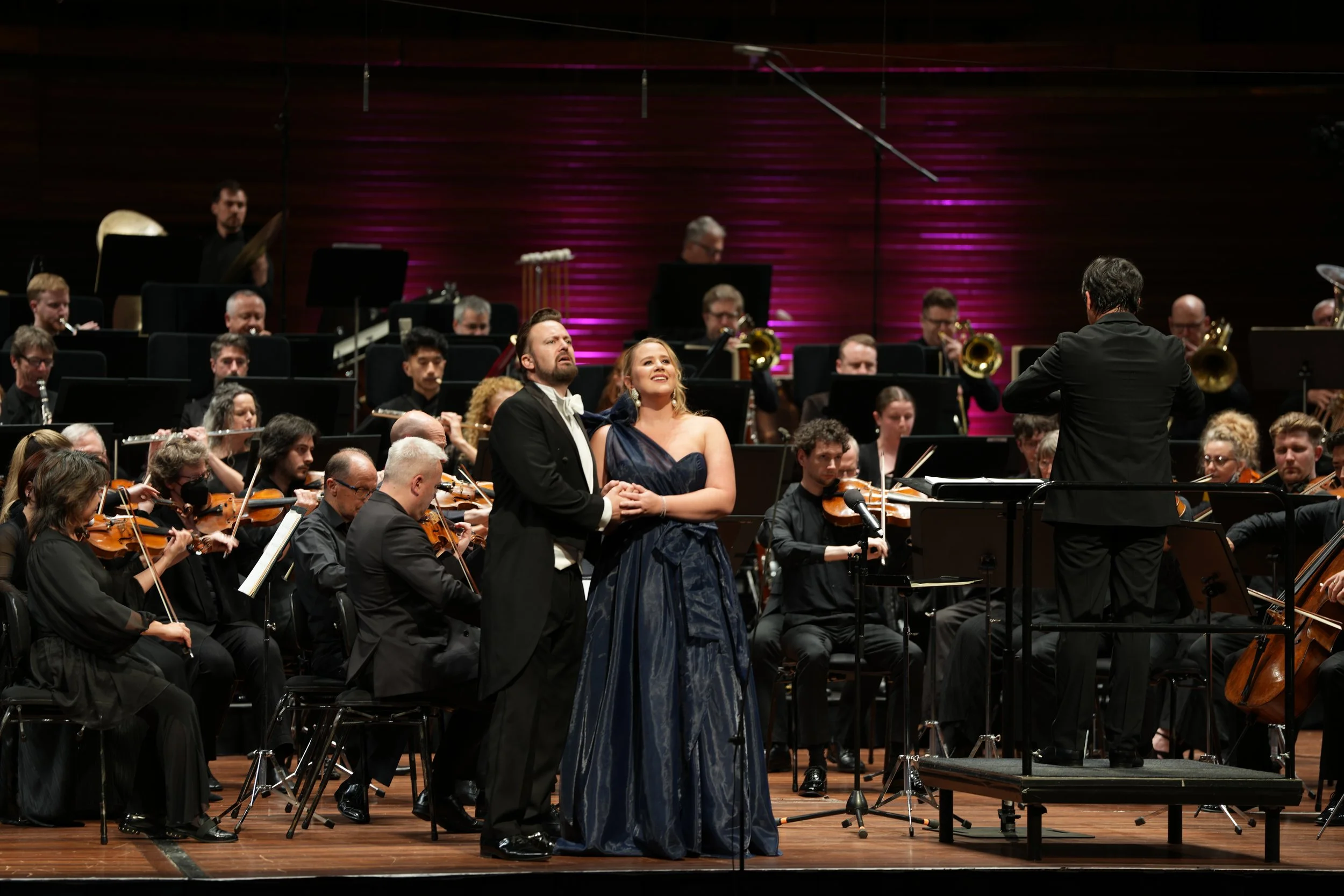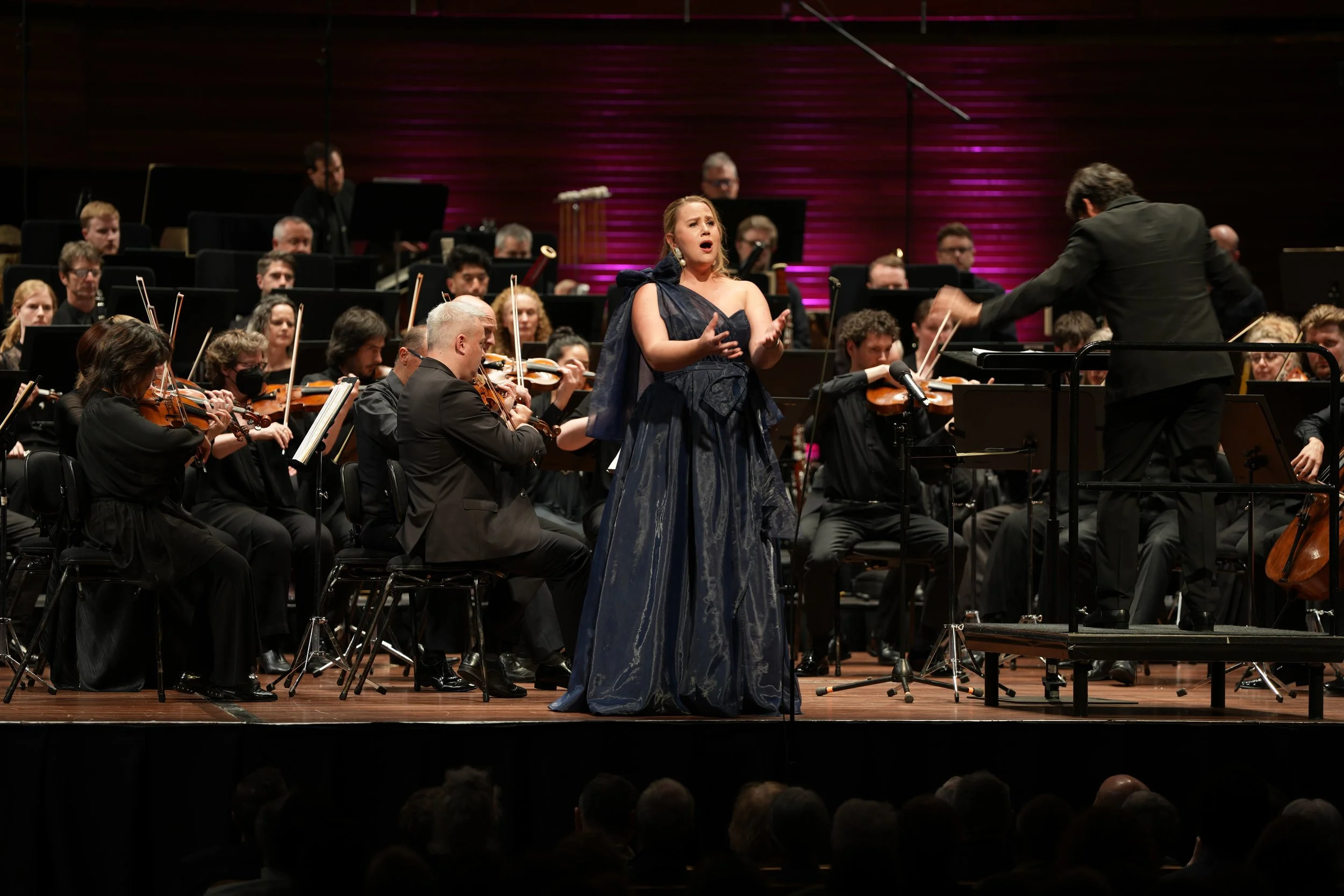NZSO Arias: operatic ‘greatest hits’ offers many pleasures
Tenor Paul O’Neill and soprano Eliza Boom in one of the romantic duets that were highlights of the NZSO’s Arias programme
Image credit CRAIG CHILD/NZSO
Composing an Overture for his opera La Forza del Destino (The Force of Destiny), Giuseppe Verdi, like many composers of opera, shamelessly pulled out the best bits from the work and combined them. A “fate” motive, announced by brass and bassoons, is followed by a succession of lovely tunes, some associated with the heroine Leonora and others offering a taste of the opera’s key characters and moments.
Much the same approach was used for the programme Verdi’s overture opened, the NZSO’s “Arias: Puccini’s operatic greats”. Favourite hits from Giacomo Puccini’s most-loved operas were combined, interspersed with overtures and intermezzi from Italian opera’s golden age in the 19th century.
Conductor José Luis Gómez introduced the works performed with engaging charm and energy
Image credit CRAIG CHILD/NZSO
Charismatic Venezuelan/Spanish conductor José Luis Gómez led the NZSO in a splendidly forthright performance of Verdi’s Overture before explaining the links between the three famous arias and duet that followed, a kind of highlights reel summarising the story of Puccini’s popular opera Tosca.
For this concert, the NZSO featured two opera singers currently building impressive careers on the international stage. Lyric soprano Eliza Boom is a New Zealander who placed second in the 2018 Lexus Song Quest. She is now based in Germany and performing across Europe. Her voice is radiantly beautiful, with a big upper register that mostly transcended the ungrateful Michael Fowler Centre acoustics to soar over the orchestra. Australian tenor Paul O’Neill has also been based in Germany as an ensemble member of the Berlin State Opera, and currently works extensively in both Europe and Australia. His voice is a lyric/spinto tenor, not a huge instrument, but a voice with a lovely glow, which he uses beautifully to express emotions in Puccini’s beloved arias and duets.
Performing operatic repertoire in a concert performance, without surtitles, with a large orchestra on a resonant stage rather than an opera house pit, inevitably risks depriving the audience of some of the emotional and narrative impact of a full staging. Wellington Opera’s recent and highly successful Tosca was fresh in many of our minds, so conductor, singers and musicians had an additional challenge in convincing us of the passions and theatricality of Puccini’s familiar music.
Soprano Eliza Boom
“…a radiantly beautiful lyric soprano voice with a big upper register.”
Image credit CRAIG CHILD/NZSO
They succeeded, largely because of the high musical quality of the performances. Both Puccini and conductor Gómez have impeccable timing in affecting and touching moments. The orchestral performance was musically terrific, with a gorgeous full string tone and fine playing by the harpist and wind, brass and percussion soloists and sections.
Both singers warmed up as the concert proceeded, drawing us into the passion of their characters. There were moments when the orchestral accompaniment seemed a little too loud, as in the touching duet Dolce notte! from Madame Butterfly, but the two singers had a lovely stage rapport and their romantic duets throughout the programme offered several expressive highlights.
The second half opened with another cracker of an overture from Verdi, this one from his Nabucco, opening with a compelling low brass choir, an effective snare drum adding grit to the texture. Gómez drew a big range of moods from the orchestra, including the nationalistic fervour of the famous anthem for freedom.
This conductor’s flawless and sensitive timing in accompaniment and unfailingly lovely singing from the soloists then seduced the audience in arias from Puccini’s La Bohème, Manon Lescaut and Gianni Schicchi. But by the time we got to O mio babbino caro (O my dear papa), though beautifully sung by Boom, I felt as if I’d eaten a few too many chocolates at a sitting. All that sweetness had begun to cloy. Well-chosen orchestral intermezzi by Mascagni and Leoncavallo broke up the arias, and the concert ended with – what else? – the famous tenor aria Nessun dorma from Puccini’s Turandot, sung with ardent passion by O’Neill.
Tenor Paul O’Neill
“…a voice with a lovely glow, used beautifully to express emotion.”
Image credit CRAIG CHILD/NZSO
The audience seemed entranced throughout and was very enthusiastic in its final ovation. The concert delivered exactly what it promised “on the tin” – Puccini’s most popular arias, superbly sung and played. The “greatest hits” approach to opera is not my favourite way to experience this art form, but the NZSO, Maestro Gómez and singers Boom and O’Neill gave us an evening of many musical pleasures.
NZSO ‘Arias: Puccini’s operatic greats’ José Luis Gómez (conductor), Eliza Boom (soprano), Paul O’Neill (tenor). Wellington, October 24, 2024.




